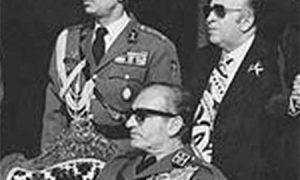Studying the policies of Pahlavi regime concerning the Baha’is during the years 1332- 1357 S.H. needs for the nature of the government to be investigated in one side and for the Baha’is behaviors to be studied in other side. The establishment of Pahlavi Kingdom can be assumed as the onset for formal and clear performance of programs and policies planned and organized for separating religion foundation out of government, fainting the role of scholars and clergymen in public atmosphere and policy domain and judicial and educational reforms to decrease the role of religion agents. At this point of view, secularism of this period of time resemble the governmental ideology serving its aims to do a series of changes and transformations in the judicial system, educational system and eventually focusing on regime power.
Due to planning and executing this approach, a suitable atmosphere for the activities of the Baha’is were created. Performing nine-year plan and the five-year one, forming national assemblies in discipline, publishing books and magazines by the Baha’is, establishing and holding classes for education and proselytizing are of some various aspects and dimensions of these activities. On other side; during this period of time, regime started struggles systematically for stabilizing power as much as possible. Pahlavi court which had been weakened during the years before the coup and lost its control over power resources such as army and parliament seized the time for gathering power and confronting rivals.
The following measures done by the court in favor of itself:
۱) Meddling with elections to control the parliament
۲) Executing the policies of modernization to weaken and limit the power of religious and traditional forces like those who worked in bazar.
۳) Repressing national opponents
۴) Filtering the army out of national left forces
۵) Executing the programs of white revolution aiming deposing aristocrats possessing lands and religious forces
At the same time, new tools were provided to make the court possible to be influential more on power sources like parliament and economy. Establishing New Iran party can be evaluated in this regard. So, the party was considered as regime’s tool to perform the policies.
If the secularism of Pahlavi era were in the service of providing opportunities for Baha’ism growth in domains such as community, culture and economy, the necessities for genesis of absolute regime opened the gate for the reality of reciprocal relation between the Baha’is and the regime. Consequently, this factor caused the Baha’is to promote the qualities of their activities and to enter into policy arena. New Iran party was regime’s tool to influence on domains such as economy and community and to attract new forces.
“Establishing Now Iran party became just one of multiple stages of this process ended in centralism. As we said before, the court tried to limit financial and political powers of its rivals and religious forces to fight them. Consequently, due to of formal lack of religious opposition and the existent and secular regime’s supports, the economic, political and cultural achievements increased.
The nature of regime and the structure of Pahlavi government were just the influential factors in this process. On the other side, the Baha’is behavior towards regime played a key role in regulating these policies.
Thus, three variables of secularism, the necessities genesis of absolute regime and the behavior minority caused Bahaism to be active in all pillars of Pahlavi regime including policy (the prime minister Hoveyda and many of his ministers), military (Asadullah Saniee, Parviz Khosrowani, Abdul Karim Ayadi), culture (the chairman of TV., Habib Sabet Pasal, Houshang Nahavandi, ministry of science and etc.) economy (Hojabr Yazdani), security (Parviz Sabeti). So, Bahaism was a trustful counsellor for Pahlavi regime possessing strong foreign cover (the Zionistic regime, England, America and etc.) to such an extent that the Baha’is mentioned in interior and exterior assemblies that Muhammad Reza Shah was a Baha’i.






